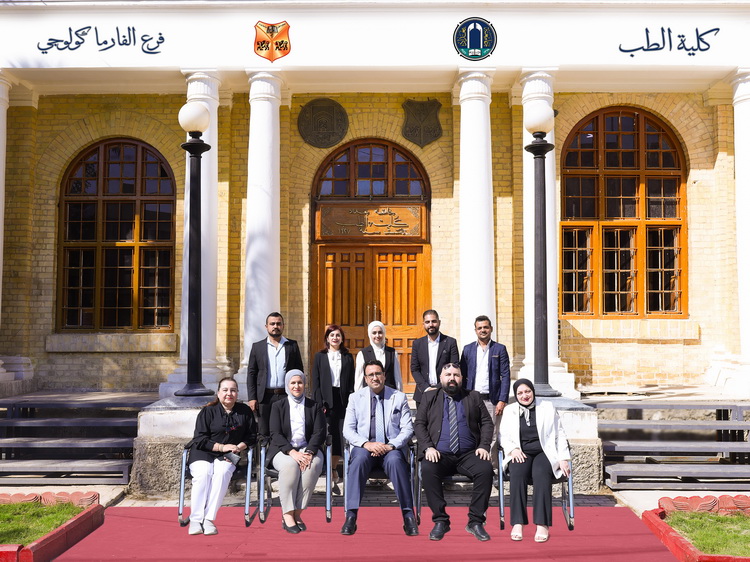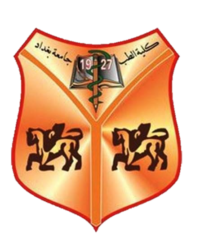
Department Establishment Date: 1927
Current Teaching Staff:
- Prof. Dr. Mohammed Abdulhassan Jabarah Al-Zubaidi
- Assoc. Prof. Dr. Samarh Mufaq Ali
- Assoc. Prof. Dr. Mohammed Qasim Yahya Mal Allah Al-Atarjji
- Assoc. Prof. Dr. Huda Ibrahim Qasim
Teaching Staff Since Department Establishment and Their Academic Ranks:
- Prof. Dr. Youssef Zia Abo
- Prof. Dr. Ghazi Al-Hajjam
- Assoc. Prof. Dr. Hamid Al-Katib
- Prof. Dr. Suhaila Abdul Razzaq
- Prof. Dr. Hatham Al-Jubouri
- Prof. Dr. Qasim Abdul Hamid
- Dr. Aliya Rasheed Azat
- Dr. Tawfiq Mustafa Al-Hassani
- Prof. Dr. Imad Bashar Farjo
- Dr. Bathina Hamoud Jalil
- Dr. Tarek Toma Bato
- Dr. Naseer Abdulameer Hadi Al-Harjann
- Dr. Haider Mehdi Jawad Al-Shakarji
- Assoc. Prof. Dr. Ahmed Mahmoud Al-Zuhairi
- Assoc. Prof. Dr. Samer Yousif Matlob
- Dr. Najeeb Ibrahim Hassan
Scientific Achievements of the Department:
- Opening of the first Master's study in the country in 1972.
- Opening of the first Ph.D. study in the country in 1992.
- Ranked first in the Ministry Examinations for the years 97-98 and 98-99, which included the pharmacology subject.
- Obtained first place in the medical field within the distinguished Iraqi patents for the year 1996.
- Obtained first place in the medical field within the distinguished Iraqi patents for the year 1998.
- Received the annual award from the Iraqi Medical Association in 2002.
- Two teaching staff members were included in the privileges of scientific personnel care for the year 1999.
- Achieved dozens of scientific research published in international high-impact factor databases.
Specializations in Pharmacology Branch:
General Specialization:
- Bachelor of Medicine and Surgery
- Bachelor of Pharmacy
- Bachelor of Veterinary Medicine
- Bachelor of Dentistry
Department Statistics
| # | Category | Research Stage | Preparatory Stage | Total |
|---|---|---|---|---|
| 1 | Faculty Members | - | - | 5 |
| 2 | Postgraduate Students | Master's | 24 | 28 |
| Doctorate | 10 | 10 | ||
| 3 | Programs | Master's and Doctorate | ||
| 4 | Ratio of Faculty to Students (%) | 8:1 | ||
"The Department of Pharmacy is responsible for teaching the principles of pharmacology and the art of therapy. It is considered essential in the student's relationship with clinical training."
"The mission of the department is to teach medical students the principles of pharmacology and the general characteristics of safe drug therapy for various diseases. This includes familiarizing students with new medications, emphasizing the mechanism of drug action, clinical applications, side effects, usage guidelines, and drug interactions."
The objectives of the department are:
- To educate undergraduate and postgraduate students on the fundamental principles of pharmacology and therapeutics to promote rational drug use and develop safe treatment regimens for patients.
- To stay updated with the latest advancements in the field of pharmacology.
- To facilitate basic and applied research that contributes to the development and advancement of pharmaceutical knowledge for faculty members and postgraduate students.
- To encourage students to acquire knowledge related to their future specialization by gathering updated information from various sources in addition to the college curriculum.
The Pharmacology department was established at the College of Medicine in Baghdad two years after the college's foundation in 1927. It occupied the left part of the right wing of the college building under the name of 'Department of Medical Vocabulary' (ATERIAMEDICA M). The late Professor (Stace) was responsible for teaching the subject. He was also the first internal medicine physician at the Royal Hospital and in charge of the male (9) and female (2) internal medicine wards.
Dr. Saeb Shakut, who was the first head of the General Surgery Department at the College of Medicine in Baghdad in 1927, mentioned that he vacated two wards in the Royal Hospital (later known as the Republican Hospital), Ward (10) and Ward (11), for teaching purposes. He established a laboratory in the tenth ward that contained the necessary equipment for teaching physics, chemistry, and biology. Ward (11) was divided into two sections, one for lectures and the other for practical anatomy. The late Dr. Abdul Rahman Al-Jorbagi, who was one of only four students in the second batch of the College of Medicine, and the first pre-medical graduate to be admitted to the medical college, said: "Dr. Stacey, or Stace, the British physician, was the first to teach clinical training and pharmacology, the science of drugs and treatment. He taught this subject as it was taught in the 1920s and 1930s in England as 'medical vocabulary.' It involved studying the substances (medications) used by doctors as drugs to treat diseases. In other words, drug X or drug Y is used to treat disease X. As medical science and treatment advanced, the study of these drugs evolved as well. The study of medications expanded to understand why a certain drug is used for a specific disease, how it works to address the disease, and whether it has other effects on the body, in addition to its impact on the disease itself. This field became known as 'pharmacology,' which involves a comprehensive and detailed study of drugs, including their preparation, effective dosage, toxic dosage, mechanism of action, method of use, side effects, and benefits. These details are referred to as 'clinical pharmacology.' The first pharmacology professor at the College of Medicine was a Dutch professor named Sied Juries, appointed in 1949. He was followed by Professor Graham and Professor Peterhay. Professor Mahdi Fawzi, Professor Salem Al-Damluji, and Professor Sanha Amin Zaki have been associated with this department since its establishment. They were followed by Alaa Al-Khalidi, who was the first physician to obtain a doctorate and specialization in pharmacology during the days of Sied Juries. They were subsequently followed by Yousif Abu, Hamid Al-Katib, Dr. Farouk Hassan Al-Jawad, Dr. Qasim Abdul Hamid, and Dr. Emad Farjo. Dr. Sanha Amin Zaki became the first Iraqi woman to head the Pharmacology department, followed by Yousif Abu, Dr. Farouk, Dr. Hatham Al-Jubouri, and Dr. Emad Farjo."
Academic Staff – Department of Pharmacology
For a complete and regularly updated list of faculty members in the Pharmacology department, please visit the University of Baghdad Pharmacology Repository .

